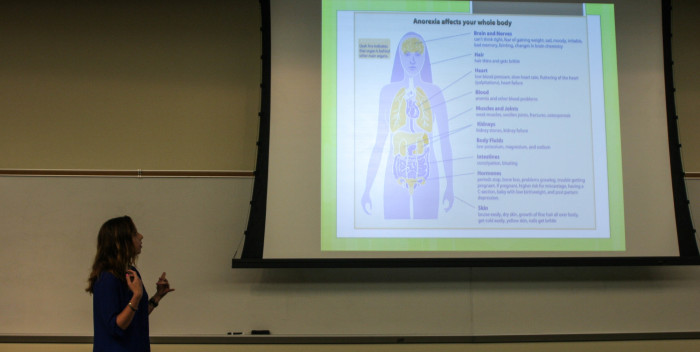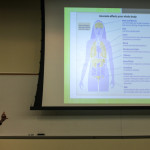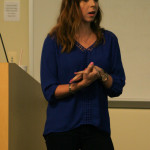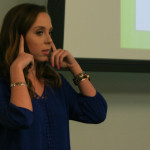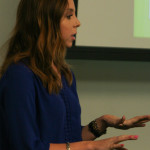UNL Student Becca Schollaert Discusses Starving for Perfection
by Abigail Wisniewski
Becca Schollaert shared her story of her nine-year struggle with an eating disorder and educated Concordia students on the effects, variations and warning signs of eating disorders on Wednesday, March 30.
Schollaert, a senior at the University of Nebraska-Lincoln, began wrestling with bulimic, anorexic, and binging and purging tendencies after a classmate made a negative comment about her weight in seventh grade.
“There’s this saying that sticks and stones may break my bones but words will never hurt me—and that is crap,” Schollaert said. “Sticks and stones may break my bones but words may cause me to have this eating disorder for nine years.”
Eating disorders are a widespread issue in the United States. Studies show that four out of 10 people suffer from an eating disorder, and 95 percent of those are between the ages of 12 and 24.
Schollaert believes that the increasing number of those affected by eating disorders is enhanced by media images which depict an “ideal body image”—an image that only five percent of females in the United States actually have.
“If we’re standing in line at the grocery and seeing these models in magazines, we have to remember that that person doesn’t even look like that,” Schollaert said after showing a video that demonstrated how photoshop alters a model’s image.
Schollaert explained that anorexia is not the only eating disorder, and that other eating disorders such as bulimia and binge eating disorder (BED) are less visible but just as prevalent.
Though eating disorders have the highest mortality rate of any mental disease, only about one in 10 of those affected seek help.
“If you’re sick you go to the doctor. If you have a mental disease you should go to therapy,” Schollaert said. “People [could] see it as a sign of weakness, but I think it’s more of a sign of strength if you can say, ‘You know what? I need help.’”
Schollaert encouraged listeners to talk to someone if they are suffering from an eating disorder, but explained that it is best to listen before speaking.
“Think about the person and what they react to best,” Schollaert said. “Above all, react with support and kindness.”
- Photo by: Kimberly Sleeper
- Photo by: Kimberly Sleeper
- Photo by: Kimberly Sleeper
- Photo by: Kimberly Sleeper
- Photo by: Kimberly Sleeper
- Photo by: Kimberly Sleeper


